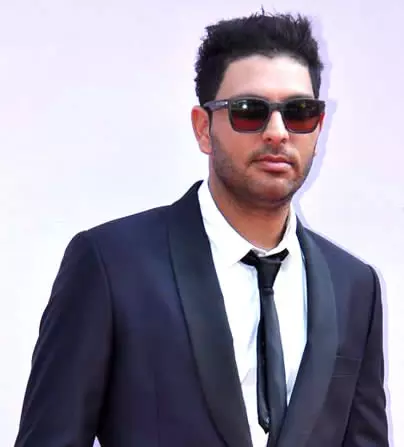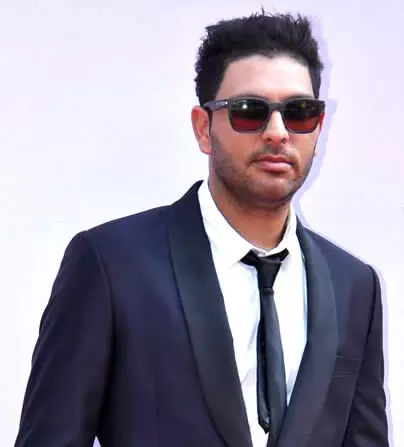
Yuvraj Singh is an Indian cricketer and all-rounder who bats left-handed in the middle order and bowls left-arm orthodox spin part-time. He has represented his country in all formats of the game, has represented Punjab in domestic cricket, and is currently playing for Kings XI Punjab in the IPL. He has previously represented a number of IPL franchises, including Sunrisers Hyderabad, which he assisted in winning their first title. He learnt the game early on as the son of a former India cricketer and soon rose through the youth ranks to win a place in the national team.Facing his inconsistencies, he has proven his worth in the squad and rescued India on several occasions with match-winning results. His cricket career came to an immediate end when he was diagnosed with cancer, but he overcame the disease and made a successful recovery, which he detailed in his autobiographical memoir, ‘The Test of My Life.’ He is the founder and director of the ‘YouWeCan’ charity, which has supported thousands of cancer patients over the years.
Childhood and Puberty
Yuvraj Singh was born in Chandigarh, India, on December 12, 1981, to Yograj Singh and Shabnam Singh. His father was a fast bowler who represented India in international cricket. He opted to live with his mother after his parents split.
He went to Chandigarh’s DAV Public School and played cricket with his aunt. He was also fine at tennis and roller skating, but his father allegedly threw away his trophy after he won the National Under-14 Roller Skating Championship and ordered him to concentrate on cricket.
A Career
Yuvraj Singh made his first-class debut during the 1997–98 Ranji Trophy after debuting for Punjab Under-16s a month before his 14th birthday in 1995-95. He was elevated to the U19 squad the next season and made his first-class debut the following season. In the Cooch Behar Trophy Final in 1999, he scored 358 runs against Bihar’s first innings score of 357, and in the Under-19 Cricket World Cup in 2000, he was named “Player of the Tournament.”
He was called to the Indian squad for the 2000 ICC KnockOut Trophy after his all-round success for the U-19 squad, and he made his ODI debut against Kenya on October 3rd, 2000. He won the ‘Man of the Match’ award after scoring 84 against Australia and 41 and taking one wicket against South Africa, but he was dropped after a bad performance in the Tri Series that followed.
In the 2001 Coca-Cola Cup, he scored 98 not out in one match and took 8 wickets in the entire series against Sri Lanka. He was dropped from the Indian squad after losing form. In March 2002, he returned to domestic cricket and scored 209 in the Duleep Trophy. When India was 1-2 down against Zimbabwe in a one-day series, he was called up and played two match-winning knocks of 80 not out and 75 in the final two rounds.
He showed consistency in the 2002 NatWest Series against England and Sri Lanka, where he did well with both the bat and the ball, after another poor series against the West Indies. He scored 69 in the final against England, putting up a 121-run partnership with Mohammad Kaif to help India chase down 326 in one of the greatest ODI victories in history.
In the games leading up to the 2003 ICC Cricket World Cup, he scored a few fast fifties to help India win, and on April 11, 2003, he struck his first century against Bangladesh. In May 2003, he was signed by Yorkshire County Cricket Club, becoming the club’s second Indian cricketer after Sachin Tendulkar.
On October 16, 2003, he made his Test debut against New Zealand, but he suffered in both the Test and the subsequent TVS Cup ODI tri-series. Following a poor ODI series against Pakistan, he reclaimed form in the tri-series against Australia and Zimbabwe, making 314 runs, and scoring his maiden century and half-century in the Test series.
In both ODI and Test cricket, his form started to deteriorate toward the end of 2004, but he emerged as India’s top run-scorer in the 2005 Indian Oil Cup triangular series in mid-2005. In the years that followed, he maintained his good form, scoring six ODI hundreds and two Test centuries, as well as many fifty-plus knocks that helped India rebound from a rocky start.
He was named vice-captain of the Indian team for the inaugural ICC World Twenty20 in South Africa in September 2007, which he made memorable by hitting six sixes in Stuart Broad’s over. He was also appointed vice-captain of the ODI side, during which he had a fruitful series against Pakistan, scoring four fifties in ODIs and a career-best 169 in Tests.
His best performance came at the 2011 ICC Cricket World Cup, where he scored 362 runs (one century and four fifties) and took 15 wickets to win Player of the Tournament. He was quickly diagnosed with a stage-1 cancerous tumour in the lung and had to endure months of chemotherapy before returning to the crease for the ICC World Twenty20 in September 2012.
He took the most wickets in the World Twenty20 campaign, but he struggled with the bat. But for a few fifties in Tests and limited-over matches, he struggled to make the best of his chances, but he was called back for the 2014 World Twenty20, during which he effectively established several wide partnerships.
He was not picked for the 2015 Cricket World Cup, but thanks to his impressive results in the Vijay Hazare Trophy, he was recalled to the T20I squad for India’s tour of Australia in January 2016. He was picked for the ODI series against England in January 2017 after scoring 672 runs in five games in the Ranji Trophy and winning the ‘Player of the Match’ award for his career-best 150 runs.
Career In IPL
Yuvraj Singh began his IPL career as the captain of Kings XI Punjab, and in May 2009, he scored his first T20 hat-trick against Royal Challengers Bangalore, followed by another against Deccan Chargers the following month. In the following seasons, he played for a variety of teams, but he was most successful with Sunrisers Hyderabad in 2016, when the team won the IPL.
Achievements & Awards
Yuvraj Singh struck six sixes off Stuart Broad in a match against England during the 2007 ICC World Twenty20 and scored the fastest half century in 12 deliveries.
In 2012, the Indian government honoured him with the Arjuna Award, and in 2014, the Padma Shri Award.
